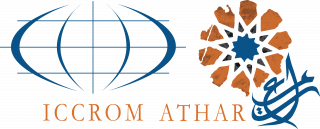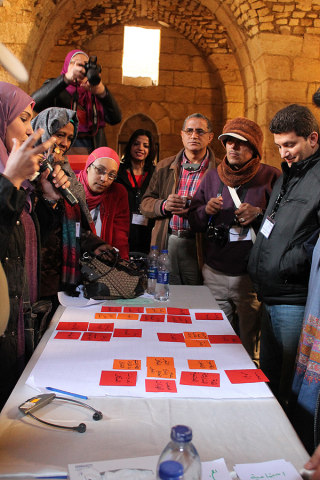A two-week specialist workshop on “Building National Capacities for Managing Risks to Cultural Heritage in Case of Emergency” concluded in Cairo, Egypt, on 29 January 2015. The workshop was co-organized by ICCROM through its recently-established ATHAR Regional Centre in Sharjah, United Arab Emirates, the UNESCO Office in Cairo, the Arab League Educational Cultural and Scientific Organization (ALECSO), in cooperation with the Egyptian Ministry of Antiquities and Ministry of Culture, and with the support of the Government of Sharjah, UAE, and the US Secretary of State. The closing ceremony was attended by Dr Stefano De Caro, Director-General of ICCROM, and HE Dr Mamdouh Damati, Egyptian Minister of Antiquities, who handed-out course certificates to the participants. Also present were: Ms Faika Bejaoui representing ALECSO, Ms Tamar Teneishvili and Dr Nazar Hassan from the UNESCO Office in Cairo, and Dr Zaki Aslan, Director of the ICCROM-ATHAR Regional Conservation Centre in Sharjah
Nominated by their governments, twenty-six participants with experience in conservation and management of cultural heritage were selected, representing Egypt, Iraq, Libya, Palestine, Sudan and Yemen.
This workshop was based on ICCROM’s experience in this field (led by Ms Aparna Tandon, Project Specialist). It aimed to create task forces recognized at national and regional levels that would be effective in managing risks to cultural heritage. Activities consisted of interactive participatory sessions and included study visits to several monuments located in Historic Cairo and Saqqara. These study visits helped to improve the participants’ learning experience by giving them the opportunity to put into practice the theory learnt throughout the workshop. Emphasis was given to the understanding of international and national legislation and how it can be applied to cultural heritage protection during crisis situations, in order to advocate for better enforcement and protection of cultural heritage during times of peace and times of crisis.
The workshop also focused on developing skills in risk management planning (risk assessment, preparedness, mitigation and response), documentation, rescue measures and security procedures for heritage protection. The involvement of local communities, mediation and negotiation skills, raising awareness in times of emergency, as well as project planning for recovery after crises, were tackled in theoretical and practical sessions. The multi-disciplinary and international teaching team included professionals who have been working in emergency situations for protecting cultural heritage and providing humanitarian assistance.
An additional long-term objective of this workshop has been to create an observatory for cultural heritage in the Arab region. This will be achieved through national teams working on projects in their home countries, implemented with the support of organizing institutions through the ICCROM-ATHAR Regional Conservation Centre in Sharjah, UAE.


